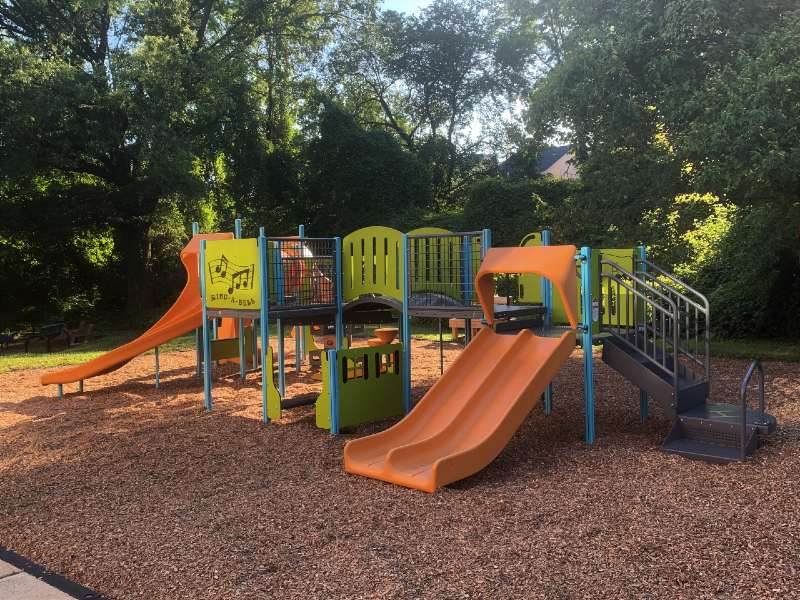It’s 6:30 p.m. on a Wednesday night and children come running through a classroom door. It looks like a scene from a summer camp, with children jumping into the arms of volunteers, or playing with toys in a bucket of soapy water. The kids are some of the youngest residents of one of the Washington-area’s emergency shelters — and it’s playtime.
The Homeless Children’s Playtime Project offers playtime for children experiencing homelessness and support for parents, who can use the time to go to classes, meet with mental health professionals, do chores, or take an uninterrupted nap. After moving online during the COVID-19 pandemic, the D.C.-based nonprofit organization is back in person. It’s launching a new program in Maryland’s Prince George’s County, expanding out of the District for the first time.
Play is often overlooked as a need for children — a critical part of healthy brain development — and taken for granted when conceiving of the challenges that underserved families face. It can also be restricted by socioeconomic situations and housing status. Children in families experiencing homelessness often undergo frequent transitions into shelters, shifts between schools, and the hurdles of living among strangers.
The Playtime Project aims to address just those challenges, through the unconventional relief of play. “We call it trauma-informed play, because what we’re trying to do is give them that opportunity to de-stress,” Lakenya Turner, a case manager at Shepherd’s Cove Emergency Shelter, said. “Being in a shelter is a traumatic experience for little kids. The program creates some sort of normalcy for them.”

Challenges to children experiencing homelessness only compounded during the pandemic. Playtime Project’s programming was canceled as shelters fought to stop the spread of COVID-19. Organizers continued communicating with families, sending activity bags to moms and bringing in virtual guests, such as D.C.-based musician Uncle Devin. The number of children attending Playtime is still down, but participation is on the rise as volunteers return in-person this summer. Playtime partners with family shelters throughout the District, including The Brooks, District Alliance for Safe Housing, My Sister’s Place, the Rita Bright Family and Youth Center, and the Turning Point Center for Women and Children. Volunteers travel to locations to offer play sessions on site.
Starting last month, Playtime extended its services outside D.C. to set up a program at Shepherd’s Cove Emergency Shelter in Prince George’s County, Maryland. Shepherd’s Cove offers short-term housing, between 30 to 90 days, to women and their children.
“We are so excited to be here. Getting that opportunity to broaden that reach and expand to more children and bring play to another shelter is such an exciting opportunity for us,” said Melanie Hatter, Playtime’s Communications Director.
A typical playtime session involves volunteers setting up a room with different play stations. When children come in, they start together at a table and then choose an activity. Volunteers pair up with children, especially toddlers, and spend time playing with toys.
Play hours give kids choices between structured activities and free play. Hatter said one goal is to give kids the chance to demonstrate autonomy where they might not have choices in their daily lives.
“Something as small as deciding whether to sit and read with this volunteer or build blocks or do balloons outside, getting that opportunity to decide instills that sense of empowerment for the kids,” Turner said.
Hatter added that many volunteers quickly become mentors to returning children.

Kieaira Lucas, a site manager for Playtime, is one such mentor. She started as an intern during the COVID-19 pandemic and returned after completing a masters degree in social work. Lucas observes the main benefits of the program on children’s social and emotional development.
“People don’t think about playtime in the social emotional skills of children. They don’t think about the other things that you can gain from playtime and having playtime, especially that homeless children miss out on oftentimes,” Lucas said, calling play an important “job” for children.
Volunteers also work with children with the understanding that homelessness may not be the only thing they are experiencing, especially in domestic violence emergency shelters. “They essentially meet the kids where they are,” Hatter said.
Playtime Project’s impact does not stop at working with children. In addition to providing parents extra time, according to Lucas, the program offers family therapy and works to get moms connected to housing or legal services. “It’s not just playtime — it’s holistic care and providing assistance for parents too,” she said.

Justice Manyinginya is a resident of Turning Point, a center for women and children in D.C. She began taking her son, also named Justice, to Playtime sessions so that she could attend classes offered by the center on budgeting, parenting, and housekeeping. “They’ve been great,” Manyinginya said. “It was a few hours to give us moms some time — if we needed to clean, to shower, or just sleep.”
Originally, Manyinginya admits that she was not entirely comfortable leaving her child at Playtime programming. “I’m an overprotective mom, I didn’t want to take him to daycare let alone other strangers,” she said. “But I got to know the team and build a rapport with them and they are trustworthy.”
Now, Manyinginya trusts the volunteers and benefits from the time to herself. “After a long day, a peaceful shower when you don’t have to check on your kid, I open up my laptop and apply for jobs or do classwork for the program,” Manyinginya said.
Her son, Justice, loves it too, and automatically knocks on the Playtime classroom door everytime he walks into the building. “I have to tell him ‘later’ or ‘not right now’ or ‘not today.’ He is so excited to see the ladies and the team,” Manyinginya said.

According to the 2020 Point-in-Time Count of people experiencing homelessness, 11 unaccompanied children and 1,420 children in families were experiencing homelessness throughout D.C. Included in that count were 485 youths between the ages of 18 and 24. Rates of family homelessness have fallen since 2016, when 4,667 people or 1,491 families were accounted for. In 2015, the District Department of Human Services began offering year-round shelter access to families experiencing homelessness.
It is, however, hard to predict where rates of family homelessness may stand month to month. According to an August 2020 report by the Aspen Institute, 51,000 to 57,000 D.C. households, representative of 118,000 to 131,000 people, were at risk of eviction. Families are unable to seek shelter in emergency centers that accept men and women, but reside in women- and family-specific shelters.
[Read More: There was an 800-person discrepancy between two counts of youth homelessness completed four months apart in DC]
Hatter of the Playtime Project acknowledges that family homelessness in D.C. is always changing and facing new challenges, such as the pandemic. That means the program must adapt, too. “We go to where the children are and where the need is,” Hatter said. “The landscape of homelessness moves and changes.”
And whether family homelessness is in D.C. or a nearby part of the DMV like Prince George’s County, Hatter said, the Playtime Project is committed to bringing children at least a temporary sense of normalcy and freedom from homelessness. “No matter where children live, they deserve to play,” she said.








